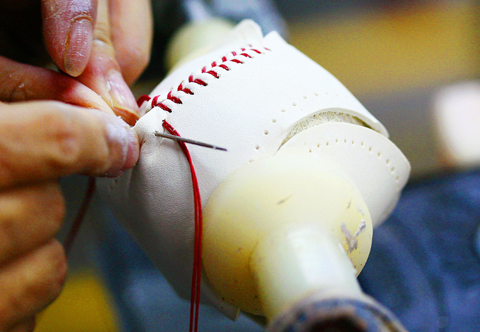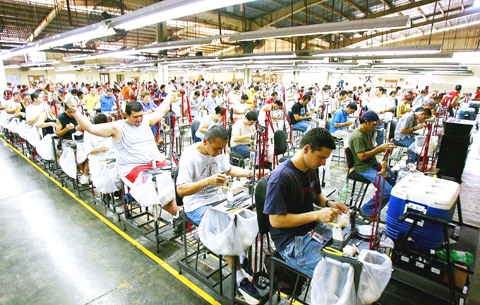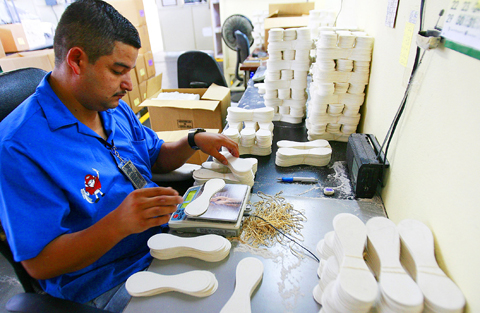The average baseball is only used for a few pitches in the US Major Leagues, but for the Costa Ricans who make them, each ball is the result of hours of painstaking stitching by hand.
For 10 hours a day, workers at the world’s only factory authorized to supply Major League Baseball, in the town of Turrialba in central Costa Rica, sit at desks yanking strands of waxy red fiber to form each baseball’s 108 stitches.
In professional games the balls quickly become too dirty and scuffed by bats to use, or get lost in the crowd on a foul ball or home run. To feed the demand, the factory turns out as many as 2.4 million baseballs a year, all assembled by hand.

PHOTO: REUTERS
The cork and rubber cores, Tennessee Holstein cowhide and gray New Zealand sheep’s wool yarn are shipped tax-free to the plant where more than 300 workers sit in neat rows to sew, their arms rhythmically rising and falling like a rowing team.
The finished balls are boxed up and shipped to Miami.
Famed for its stability in a turbulent region, Costa Rica is an economic success story in Central America, earning money from eco-tourism, coffee and fruit exports, and factories making everything from making microchips to pharmaceuticals.

PHOTO: REUTERS
Manufacturer Rawlings Sporting Goods, which has an exclusive contract to supply Major League Baseball until 2013, moved its factory here from Haiti in the late 1980s, fleeing the violent aftermath of a dictatorship in the Caribbean nation.
The workers are glad for the pay in a depressed farming town with few other jobs, but few show much interest in baseball in a country that is much more passionate about soccer.
“I really don’t understand baseball,” said Minor Quesada, who has worked at the factory for 17 years.

PHOTO: REUTERS
The work is tough and some employees have shoulder injuries from trying to churn out too many balls to win bonuses.
They earn a base salary of US$1.60 an hour, slightly above Costa Rica’s minimum wage but a world away from the US$3 million average salary of a US professional baseball player.
Still, for many in Turrialba it’s a good deal.
“It’s pretty hard to find work,” said Rocio Gamboa, 33, who has been stitching baseballs at the factory for 11 years.
She produces 200 balls a week, and receives a US$0.52 bonus for each ball she completes above the 156-ball minimum. The major league balls are sold at retail for US$14.99.

Chinese Nationalist Party (KMT) lawmakers have declared they survived recall votes to remove them from office today, although official results are still pending as the vote counting continues. Although final tallies from the Central Election Commission (CEC) are still pending, preliminary results indicate that the recall campaigns against all seven KMT lawmakers have fallen short. As of 6:10 pm, Taichung Legislators Yen Kuan-heng (顏寬恒) and Yang Chiung-ying (楊瓊瓔), Hsinchu County Legislator Lin Szu-ming (林思銘), Nantou County Legislator Ma Wen-chun (馬文君) and New Taipei City Legislator Lo Ming-tsai (羅明才) had all announced they

CHAMPIONS: President Lai congratulated the players’ outstanding performance, cheering them for marking a new milestone in the nation’s baseball history Taiwan on Sunday won their first Little League Baseball World Series (LLBWS) title in 29 years, as Taipei’s Dong Yuan Elementary School defeated a team from Las Vegas 7-0 in the championship game in South Williamsport, Pennsylvania. It was Taiwan’s first championship in the annual tournament since 1996, ending a nearly three-decade drought. “It has been a very long time ... and we finally made it,” Taiwan manager Lai Min-nan (賴敏男) said after the game. Lai said he last managed a Dong Yuan team in at the South Williamsport in 2015, when they were eliminated after four games. “There is

Nvidia Corp CEO Jensen Huang (黃仁勳) yesterday visited Taiwan Semiconductor Manufacturing Co (TSMC, 台積電), as the chipmaker prepares for volume production of Nvidia’s next-generation artificial intelligence (AI) chips. It was Huang’s third trip to Taiwan this year, indicating that Nvidia’s supply chain is deeply connected to Taiwan. Its partners also include packager Siliconware Precision Industries Co (矽品精密) and server makers Hon Hai Precision Industry Co (鴻海精密) and Quanta Computer Inc (廣達). “My main purpose is to visit TSMC,” Huang said yesterday. “As you know, we have next-generation architecture called Rubin. Rubin is very advanced. We have now taped out six brand new

POWER PLANT POLL: The TPP said the number of ‘yes’ votes showed that the energy policy should be corrected, and the KMT said the result was a win for the people’s voice The government does not rule out advanced nuclear energy generation if it meets the government’s three prerequisites, President William Lai (賴清德) said last night after the number of votes in favor of restarting a nuclear power plant outnumbered the “no” votes in a referendum yesterday. The referendum failed to pass, despite getting more “yes” votes, as the Referendum Act (公民投票法) states that the vote would only pass if the votes in favor account for more than one-fourth of the total number of eligible voters and outnumber the opposing votes. Yesterday’s referendum question was: “Do you agree that the Ma-anshan Nuclear Power Plant